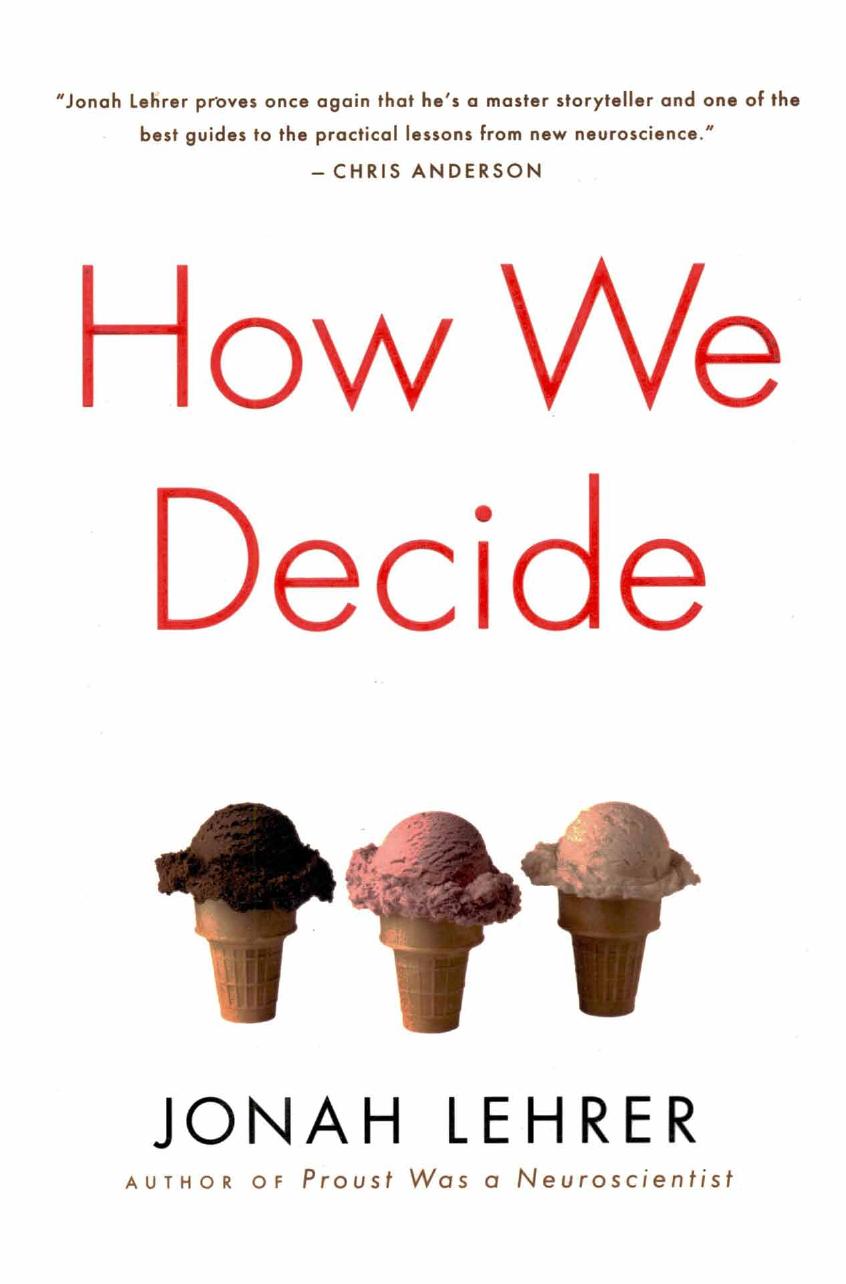How We Decide by Jonah Lehrer

Author:Jonah Lehrer
Language: eng
Format: mobi, epub, pdf
Tags: Science, Self-Help
ISBN: 9780618620111
Publisher: Houghton Mifflin Co
Published: 2009-01-07T00:00:00+00:00
WILSON WAS INTRIGUED by the strawberry-jam experiment. It seemed to contradict one of the basic tenets of Western thought, which is that careful self-analysis leads to wisdom. As Socrates famously said, "The unexamined life is not worth living." Socrates clearly didn't know about strawberry jam.
But perhaps food products are unique, since people are notoriously bad at explaining their own preferences. So Wilson came up with another experiment. This time he asked female college students to select their favorite poster. He gave them five options: a Monet landscape, a van Gogh painting of some purple lilies, and three humorous cat posters. Before making their choices, the subjects were divided into two groups. The first was the nonthinking group: they were instructed to simply rate each poster on a scale from 1 to 9. The second group had a tougher task: before they rated the posters, they were given questionnaires that asked them why they liked or disliked each of the five posters. At the end of the experiment, each of the subjects took her favorite poster home.
The two groups of women made very different choices. Ninety-five percent of the non-thinkers chose either the Monet or the van Gogh. They instinctively preferred the fine art. However, subjects who thought about their poster decisions first were almost equally split between the paintings and the humorous cat posters. What accounted for the difference? "When looking at a painting by Monet," Wilson writes, "most people generally have a positive reaction. When thinking about why they feel the way they do, however, what comes to mind and is easiest to verbalize might be that some of the colors are not very pleasing, and that the subject matter, a haystack, is rather boring." As a result, the women ended up selecting the funny feline posters, if only because those posters gave them more grist for their explanatory mill.
Wilson conducted follow-up interviews with the women a few weeks later to see which group had made the better decision. Sure enough, the members of the non-thinking group were much more satisfied with their choice of posters. While 75 percent of the people who had chosen cat posters regretted their selection, nobody regretted selecting the artistic poster. The women who listened to their emotions ended up making much better decisions than the women who relied on their reasoning powers. The more people thought about which posters they wanted, the more misleading their thoughts became. Self-analysis resulted in less self-awareness.
This isn't just a problem for insignificant decisions like choosing jam for a sandwich or selecting a cheap poster. People can also think too much about more important choices, like buying a home. As Ap Dijksterhuis, a psychologist at Radboud University, in the Netherlands, notes, when people are shopping for real estate, they often fall victim to a version of the strawberry-jam error, or what he calls a "weighting mistake." Consider two housing options: a three-bedroom apartment located in the middle of a city that would give you a ten-minute commute, and a five-bedroom McMansion in the suburbs that would result in a forty-five-minute commute.
Download
How We Decide by Jonah Lehrer.mobi
How We Decide by Jonah Lehrer.epub
How We Decide by Jonah Lehrer.pdf
This site does not store any files on its server. We only index and link to content provided by other sites. Please contact the content providers to delete copyright contents if any and email us, we'll remove relevant links or contents immediately.
The Art of Thinking Clearly by Rolf Dobelli(10472)
The 5 Love Languages: The Secret to Love That Lasts by Gary Chapman(9800)
Mindhunter: Inside the FBI's Elite Serial Crime Unit by John E. Douglas & Mark Olshaker(9332)
Becoming Supernatural by Dr. Joe Dispenza(8209)
Nudge - Improving Decisions about Health, Wealth, and Happiness by Thaler Sunstein(7698)
The Road Less Traveled by M. Scott Peck(7601)
Mastermind: How to Think Like Sherlock Holmes by Maria Konnikova(7334)
Enlightenment Now: The Case for Reason, Science, Humanism, and Progress by Steven Pinker(7309)
Win Bigly by Scott Adams(7191)
The Way of Zen by Alan W. Watts(6611)
Factfulness: Ten Reasons We're Wrong About the World – and Why Things Are Better Than You Think by Hans Rosling(4739)
The State of Affairs by Esther Perel(4715)
Gerald's Game by Stephen King(4647)
Man's Search for Meaning by Viktor Frankl(4593)
The Confidence Code by Katty Kay(4253)
Thinking in Bets by Annie Duke(4221)
The Healing Self by Deepak Chopra(3568)
Hidden Persuasion: 33 psychological influence techniques in advertising by Marc Andrews & Matthijs van Leeuwen & Rick van Baaren(3563)
The Worm at the Core by Sheldon Solomon(3486)
